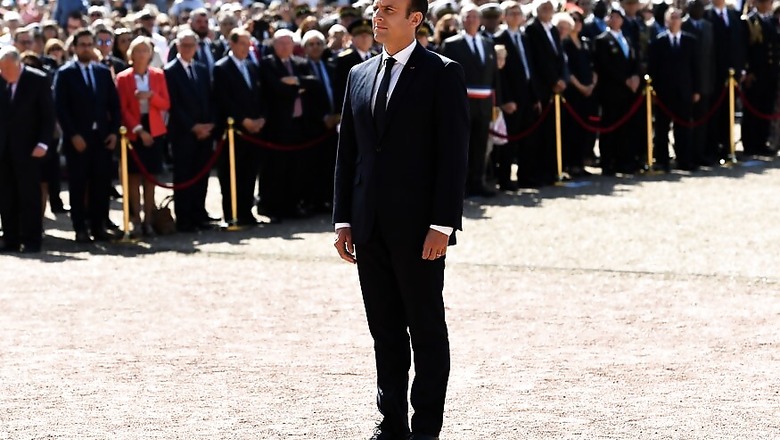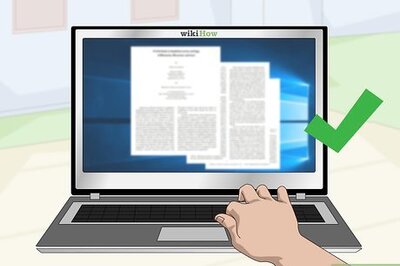
views
Paris: French unions have lost many of their traditional allies in parliament after Sunday's parliamentary election result, but President Emmanuel Macron cannot afford to ride roughshod over them if he is to successfully push through his reform agenda.
The size of his majority - already assured according to official figures and set to be over 350 seats in the 577 seat lower house according to projections - means Macron and his year-old centrist party can now count on lawmakers to give his government powers to wave the reform through without lengthy negotiations in parliament.
He has routed the left, yet he needs to handle France's muscular unions with care.
At stake is not only the injection of flexibility into the labour market he has promised. The way he handles his labour reforms will also set the tone for more reforms in the coming years, including a revamp of jobless benefits and retirement systems.
Though uneasy about Macron's programme and fearful that it is being rushed, most unions are relieved his government has so far been careful to consult closely with them, and that it has promised to come up with detailed proposals in the coming weeks.
The question now is whether he will keep taking their input on board, said Jean-Claude Mailly, head of France's third biggest union, Force Ouvriere (FO).
"Is he going to say, 'you don't agree, well, I'm going to push (the reform) through by force'?," Mailly asked in an interview with Reuters.
"If so, one thing's for sure, his presidency is going to get off to a bad start on labour relations and there will be tensions," he added.
Even France's most reform-friendly and biggest private-sector union, the CFDT, refuses to rule out protests if its counter-proposals are ignored.
"We reserve the possibility like everyone to give our point of view democratically. If we have to hold protests, we will. If we have to mobilise in companies, we'll do it," CFDT head Laurent Berger told Reuters in an interview.
WELL-CHOSEN MINISTER
Working in the government's favour is the fact that the unions know and respect new Labour Minister Muriel Penicaud, a former head of human resources at food group Danone who has also held a variety of posts in public and private institutions.
That is a big difference from her predecessor Myriam El Khomri, who faced a steep learning curve when former President Francois Hollande tasked her with launching a previous labour reform that sparked weeks of strikes and protests.
Not only is Penicaud no fresh-faced newcomer, her team is also steeped in the subtleties of French labour relations - with a head of staff from the national employers association and a deputy who was a top FO union negotiator.
However, the leak in early June of a ministry document suggesting the reform could be more radical than previously floated left the government scrambling to assure unions that the paper was merely for reflection and not an official position.
Now, unions are anxiously awaiting detailed proposals, and they make no secret of their opposition in part or in full to some of the ideas outlined already.
"The indispensable starting point has to be a period of sincere dialog. We'll see in the coming weeks if it's sincere," the CFDT's Berger said.
FO's Mailly said that the unions were all against a proposal to let employers call workplace referendums on labour issues, which he said amounted to "short-circuiting" the unions.
Unions are also anxious about plans to allow for more decisions about labour conditions to be decided at the company level rather than the sector level, which would also potentially weaken unions.
A further flashpoint is plans to set a limit on dismissal payouts that labour courts can order employers to pay.
UNION UNITY?
Although France's has one of the lowest rates of unionisation among developed countries, unions have wielded considerable clout hammering out collective agreements that cover most employees.
However, in recent years their sway has gradually ebbed as strikes have become less frequent, less disruptive and less successful.
Division among the unions made it easier last year for Hollande to push through his more measured labour reform, which the CFDT supported but the Communist-rooted CGT unsuccessfully fought with weeks of strikes.
While the other unions are working to coordinate their positions, there is still bad blood between members of the CGT and the CFDT, which earlier this year displaced the CGT has France's biggest private-sector union.
"If (the CGT) sees a risk of becoming isolated, it will have to move closer to the other unions. But it is not clear it is ready to go down that path?" said Jean-Dominique Simonpoli, head of the Dialogues labour think tank and himself a former CGT member.
The scale of Macron's victory may even inspire some hardliners to dig in for a tough fight to prove they remain relevant.
Jean-Luc Melenchon, the leader of the far left France Unbowed party, was among those promising a "social struggle" if Macron bulldozed workers' rights, which are cherished by many in France.
"I hereby inform the new powers that be not a foot of ground will be given up in the labour law struggle," Melenchon said in a fiery speech after winning a parliamentary seat for Marseille.















Comments
0 comment